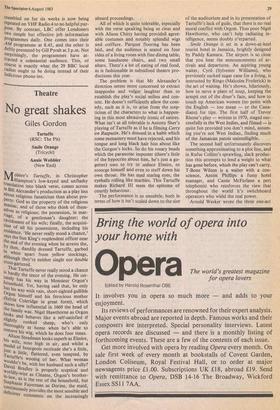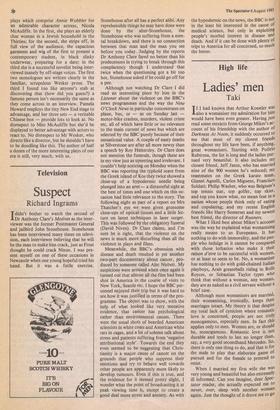Theatre
No great shakes
Giles Gordon
Tartuffe (RSC: The Pit) Smile Orange (Tricycle) Annie Wobbler (New End)
IVIoliere's Tartuffe, in Christopher Hampton's low-keyed and unflashy translation into blank verse, comes across in Bill Alexander's production as a play less about religious fanaticism than about pro- Deny: God as the property of the religious Maniac, and of those who think of them- selves as religious; the possession, in mar- riage, of a gentleman's daughter; the ravishment of his wife; finally, the acquisi- tion of all his possessions, including his residence. 'He never really stood a chance, says the Sun King's resplendent officer near the end of the evening when he arrests the, by then, dandily dressed Tartuffe, garbed III white apart from yellow stockings, although they're neither single nor double cross-gartered. That Tartuffe never really stood a chance is .hardly the tenor of the evening. He cer- tainly has his way in Monsieur Orgon's household. Yet, having said that, he only has his way with vain, short-sighted gullible argon himself and his ferocious mother (Sylvia Coleridge in great form), which shows how influential in 1669 the head of the family was. Nigel Hawthorne as Orgon looks and behaves like a self-satisfied if slightly zonked sheep, who's only thorough-1Y at home when he's able to
remove his wig, which he does four times.
Alison Steadman looks superb as Elmire, his wife, nose high in air, and whilst a Model of bourgeois rectitude she's a little, Just a little, flattered, even tempted, by Tartuffe's wooing of her. What woman wouldn't be with her husband such a silly? David Bradley is properly sceptical and Worldly-wise as Cleante, Orgon's brother- m-law, as is the rest of the household, but Stephanie Fayerinan as Dorine, the maid, continuously provides the most sensible and delicious comments on the increasingly
absurd proceedings.
All of which is quite tolerable, especially with the verse speaking being so clear and with Alison Chitty having provided agree- able costumes and notably splendid wigs and coiffure. Parquet flooring has been laid, and the audience is seated on four sides of a living room with fine dining table, some handsome chairs, and two small altars. There's a lot of eating of real food, as is fashionable in subsidised theatre pro- ductions this year.
The problem is that Mr Alexander's direction seems more concerned to extract inapposite and vulgar laughter than to establish the play's social milieu and con- text. He doesn't sufficiently allow the com- edy, such as it is, to arise from the scep- ticism of the characters to what is happen- ing in this most abrasively ironic of satires. What isn't at all tolerable is Antony Sher's playing of Tartuffe as if he is filming Carry on Rasputin. He's dressed in a habit which some monastery must have rejected, and his tongue and long black hair hiss about like the Gorgon's locks. So do his rosary beads which the paranoiac imposter (there's little of the hypocrite about him, he's just a go- getter) uses to try to seduce Elmire, to scourge himself and even to stuff down his own throat. He has mad staring eyes, the eyeballs rolling like marbles. This Tartuffe makes Richard III seem the epitome of courtly behaviour.
The performance is so unsubtle, both in terms of how it isn't scaled down to the size of the auditorium and in its presentation of Tartuffe's lack of guile, that there is no real moral conflict with Orgon. Thus poor Nigel Hawthorne, who can't help radiating in- telligence, seems doubly o'erparted.
Smile Orange is set in a down-at-heel tourist hotel in Jamaica, brightly designed by Paddy Kamara. The airport is so close that you hear the announcements of ar- rivals and departures. An aspiring young waiter, Cyril (Sylvester Williams), who previously sucked sugar cane for a living, is instructed by Ringo (Malcolm Frederick) in the art of waiting. He's shown, hilariously, how to serve a' plate of soup, keeping the armpit out of the diner's face, and how to touch up American women (no point with the English — too mean — or the Cana- dians) for tips. The first half of Trevor Rhone's play — written in 1970, staged suc- cessfully in the West Indies, and filmed — is quite fun provided you don't mind, assum- ing you're not West Indian, finding much of the Jamaican patois unintelligible.
The second half unfortunately discovers something approximating to a plot line, and in Rufus Collins's sprawling, slack produc- tion this attempts to lend a weight to what has gone before, which the play can't carry. T-Bone Wilson is a waiter with a con- science, Anton Phillips a fussy hotel manager, and Cassie McFarlane a pert telephonist who reinforces the view that throughout the world it's switchboard operators who wield the real power.
Arnold Wesker wrote the three one-act
plays which comprise Annie Wobbler for an admirable character actress, Nicola McAuliffe. In the first, she plays an elderly char woman in a Jewish household in the Thirties; for the second, she strips off, in full view of the audience, the capacious garments and wig of the first to present a contemporary student, in black slinky underwear, preparing for a date; in the third she is a successful novelist being inter- viewed inanely by off-stage voices. The first two monologues are written clearly in the familiar, scrupulous Wesker prose. The third I found too like anyone's stab at discovering that (how did you guess?) a famous person isn't necessarily the same as they come across in an interview. Pamela Howard employs the tiny New End stage to advantage, and her three sets — a veritable Chinese box — provide lots to look at. No disrespect to Miss McAuliffe but she'd be displayed to better advantage with actors to react to. No disrespect to Mr Wesker, who directs like a director, but he shouldn't have to be doodling like this. The author of half a dozen of the more interesting plays of our era is still, very much, with us.







































 Previous page
Previous page